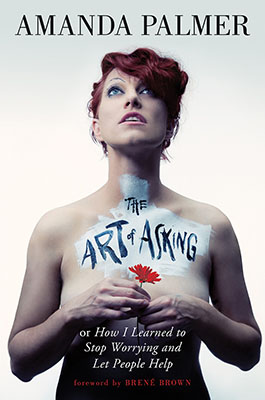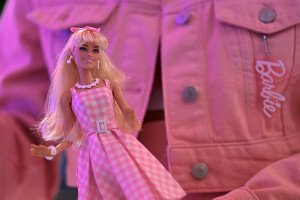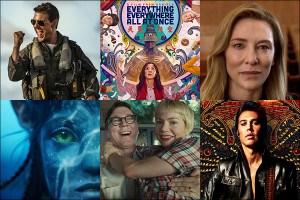Amanda Palmer Talks The Art of Asking and Her ‘Poem for Dzhokhar’

Amanda Palmer Photo by Joshua Smelser on Flickr
“Today, it is my turn to take the tampon. Tomorrow, it shall be yours.”
That is—written in the foreword of her introduction—the figurative message of Amanda Palmer’s new book, The Art of Asking. Ask and you shall receive; one day the roles will be switched. And this doesn’t just apply to feminine products.
 Palmer, a native of Lexington, is possibly one of the most notable artists to come out of these quarters. Widely known as the musician who broke free of her record label and then created a million-dollar Kickstarter to fund her own music endeavors, Palmer has since challenged the industry and the business behind music. But the cool thing is, despite her Kickstarter making such a statement, she stands firm in supporting how other artists choose to make their money and distribute their music.
Palmer, a native of Lexington, is possibly one of the most notable artists to come out of these quarters. Widely known as the musician who broke free of her record label and then created a million-dollar Kickstarter to fund her own music endeavors, Palmer has since challenged the industry and the business behind music. But the cool thing is, despite her Kickstarter making such a statement, she stands firm in supporting how other artists choose to make their money and distribute their music.
“Taylor Swift can choose to keep her music locked on iTunes, and Radiohead can choose to give it away for free, and neither of them are wrong,” she told us. “That’s really hard for people to wrap their heads around.”
The Art of Asking, on shelves now, is an extension of her popular 2013 TED talk of the same title. While the book includes anecdotes from her time growing up in Boston, with a keen focus on her busking days as “The Eight-Foot Bride” in Harvard Square, Palmer also writes about her dependence on her fans, her blog, her Twitter, and how she used her extroverted nature in her favor. The Art of Asking is quite a read—one that stays true to Palmer’s stream-of-consciousness, free-for-all writing style.
We caught up with the singer Tuesday to discuss the new book, her controversial “Poem for Dzhokhar,” and more.
In your book, as well as in your TED talk, you’re not ashamed about letting people help you—for you, it’s about reciprocation. The story you gave about exchanging tampons in the ladies room is spot on, but why do you think it’s such a vulnerable thing for people to ask for things, yet you find it empowering?
Asking is always a risk. There’s a real problem in our culture nowadays about the celebration of independence. I broke free of my label, and people are constantly hanging an independent sign on me. But the truth is that I’m the most dependent because I’m directly dependent on my fans. That’s part of what I wanted to pull the curtain back on in the book. Why are people so afraid to ask, and why is the topic so touchy? What I’ve realized is that our fear of asking points fundamentally to our disconnection from one another. And as we have expanded outward away from our communities and into cities where we all feel hyper-independent, there’s also a flip side where we’re frightened to help each other. If there’s a deeper message to the [TED] talk and the book, it has very little to do with my life, and whole lot to do with how separate from one another we’ve become.
It also seems like the media is always demanding answers from you about your intentions with the “art of asking,” whether you’re standing outside as a statue or launching a Kickstarter campaign. How do you confidently continue to do your thing without apologizing for it?
I think choosing to radically ask, connect, and trust people the way I do is very threatening to people who want to maintain the system as it is, where there are a lot of separation and middle men and boundaries. The thing I find most important is that I never try to force my system on others. I think I am a particular kind of artist. I’m very social and extroverted. But I think it’s necessary that all artists—whether it’s Taylor Swift or U2 or Kate Bush or PJ Harvey, no matter how introverted or extroverted—need to be given the freedom to pick the system they want. This is also true for humanity. There’s a massive amount of criticism flying around about how people are or aren’t succeeding in the systems they are choosing, where I think the conversation should be brought further and larger in the playing field so all these systems are acceptable…If we’re going to progress as a species, and also in the context of artists, we need to accept that there’s going to be a massive amount of diversity.
It’s funny you bring up Taylor Swift considering her recent move away from Spotify.
I think the artist has the final say on how to price and distribute and share their own work. It’s their work. The conversation needs to allow for that. It’s really [upsetting] to see artists tearing down other artists when we’re all at such extreme confusion and struggle. But it’s Taylor Swift, and her management and her label crunched numbers to decide that she’s going to somehow be better off pulling her music off Spotify. She has every right to do that.
Let’s talk about your “Poem for Dzhokhar.” Some of the lines directly address the manhunt—”your face on closed-circuit cameras,” etc.—while other lines are quite humane. That in mind, how exactly were you trying to depict Dzhokhar in this poem?
I absolutely wasn’t trying to depict him at all, which was one of the biggest misunderstandings. The closest thing I was doing was try to imagine for a split second what it may have felt like to be manhunted and wounded at the bottom of a boat, having wreaked such havoc on the city and destroyed so many lives. Our job as artists is to try to put ourselves empathetically into the heads of others. To try to understand the impossible, to try to imagine feelings beyond what we’ve experienced. If all we wrote about was how nice a cup of coffee we just had was, art would be really boring.
I wasn’t at all trying to depict or judge or much less condone his actions or his experience…It wasn’t a poem I spent a week crafting. It was a poem I wrote in under 10 minutes, kind of just as a stream of consciousness exercise between one task and another.
Were you expecting the backlash you received from publishing the poem?
In my entire career, I’ve never expected backlash. I think one common misunderstanding about me is that I like to be provocative. I, as an artist, feel like I’m at a service position and my job is to make people think and feel. I don’t like to hurt people. I don’t like to disturb people way outside of their comfort zones. I like to give people comfort and joy. Every time there has been backlash, like for instance the poem, or my Kickstarter, or to the song I wrote about abortion, it usually comes as a surprise to me. I also don’t aim my art at the commercial mainstream hoping that the stuff will get on the radio and be played at the Super Bowl halftime…And 99 percent of the time it’s a giant celebration, and then occasionally there will be some blowback.
Instead of expecting controversy from one choice to the next I’ve now come to learn that backlash goes hand in hand with the risk of being an artist who is aiming above the ordinary. And as I look back in history, I’m really not alone. Most of the artists I respect and admire have had to deal with similar rocky waters, so it really doesn’t bother me. In fact, it makes me feel a lot more centered and stronger…I have so many people, tens of thousands of people who do understand where I’m coming from for every two people that don’t.
It’s clear that you pride yourself on connecting with people and portraying yourself as an approachable, real person—so let’s talk about more ordinary things, like what’s the background on your phone?
It’s a flower!
Like a stock photo?
No! It’s a photograph of a flower that came in a bouquet someone sent me a few months ago. I was drunk and reflecting on life, and the beauty and imperfection of the flower reminded me of Neil [Gaiman, Palmer’s husband], and I put it there to remind myself of the moment, and just left it.
Where was the last place you couch surfed and what was that place like?
A couple days ago [laughs]. I was staying in Hudson, New York, in Melissa Auf der Maur’s [of the Smashing Pumpkins] basement while I worked on a musical at the Bard College. It was magnificent—it’s one of my favorite places to couch surf because Melissa has retreated from touring and now runs a fantastic music venue and has a three-year-old. Every morning I would wake up, make coffee, play ukulele to a three-year-old, and go about my day. Those are the best places to couch surf, where you can borrow a family for a while.
What’s your favorite item of clothing?
My favorite item currently is a brand-new item that just arrived in the mail. It’s a crowd-sourced kimono made out of hundreds of pieces of fabric mailed to a costume designer from my fans. All of their T-shirts and blankets are in one gigantic kimono that I am going to take on tour with me, and I’m absolutely in love with it.
What is your next blog post going to be about?
It’s a thank-you letter, since today is book release day, to all of the people on my blog who helped me write my book. I went to the blog frequently as a resource for inspiration, to ask questions, to do surveys. The celebration of this book belongs as much to them as it does to me. I wanted to stop in the middle of the storm and thank them for all the help that they gave me.
The Art of Asking is out now, Grand Central Publishing. This interview has been condensed and edited for clarity.


